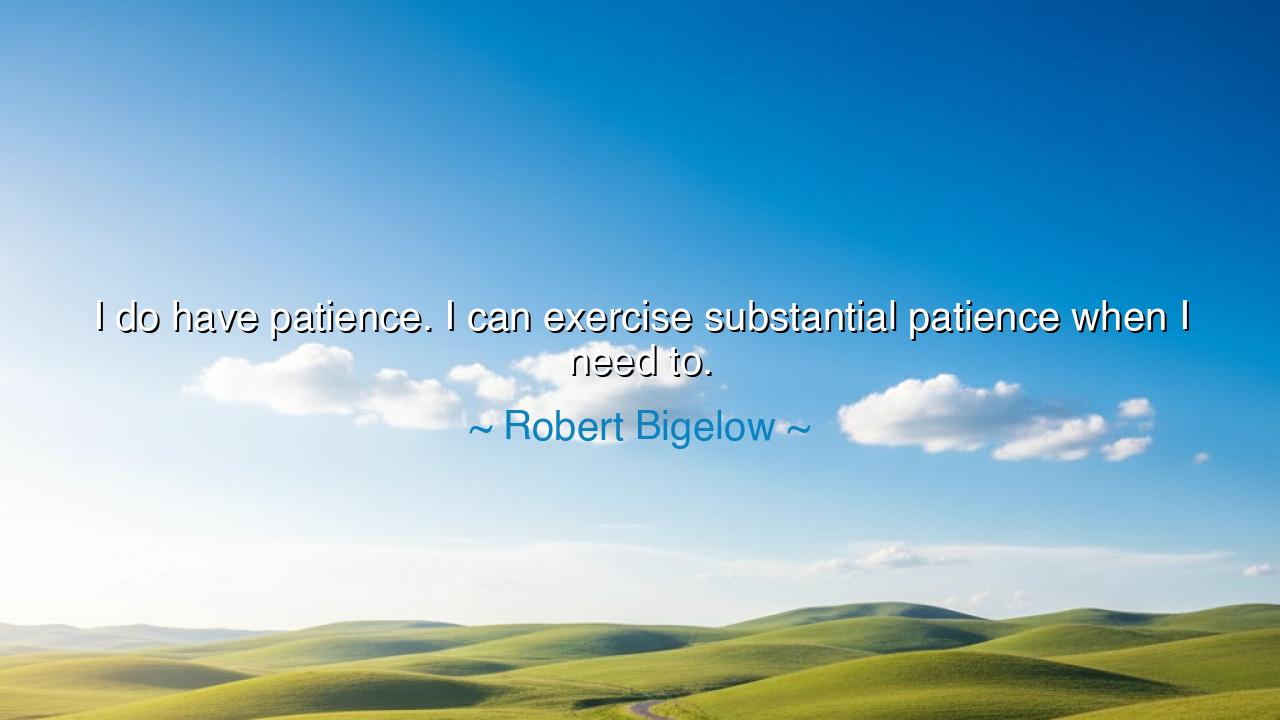
I do have patience. I can exercise substantial patience when I






Hear the words of Robert Bigelow, spoken with quiet strength: “I do have patience. I can exercise substantial patience when I need to.” At first glance, these words may appear plain, yet in truth they reveal one of the oldest and most powerful virtues known to humankind. For patience is not passivity, nor is it weakness; it is the steel hidden beneath silence, the fortress of the will that endures storms until the appointed hour to act. In them we hear the voice of one who understands that greatness is not won by haste, but by waiting with resolve until the moment is right.
When Bigelow speaks of his ability to exercise substantial patience, he acknowledges that it is not constant or idle, but chosen, disciplined, and deliberate. Patience is not something we drift into—it is something we wield. Like a sword that remains sheathed until the enemy draws close, patience is the art of withholding power until its release will be most effective. Thus, in his words, we find not resignation but mastery—the mastery of time, of temper, and of desire.
The truth of this can be seen in the story of Nelson Mandela, who endured twenty-seven years in prison. Those years were not wasted in bitterness but transformed into a crucible of strength. His patience was not the patience of a man broken, but of one waiting for the moment when freedom would come. And when it did, he emerged not consumed by rage, but tempered by endurance, ready to lead his people into a new dawn. Such is the power of substantial patience—it turns chains into preparation, exile into wisdom, and delay into destiny.
History abounds with other examples. Consider the builders of the Great Wall of China, who labored not for days or months, but across centuries. Their task was not completed by one generation, yet their patience secured their land against countless invasions. Or recall the voyage of Columbus, whose persistence through years of rejection finally bore fruit when at last the ships were given. In each case, patience was not the absence of action, but the endurance of effort through time’s long trial.
Yet Bigelow’s words also remind us of something deeper: patience is not infinite, nor is it meant to be. He does not say he is forever patient, but that he can summon patience when he needs to. This is wisdom—for there are times when to wait is wise, and times when delay is fatal. To exercise patience well is to discern the difference: to know when to endure and when to strike. The archer waits in stillness, but when the target is in sight, he must release.
The lesson for us is clear: cultivate patience as a chosen strength. In your work, in your struggles, in your dreams, do not demand that all things come at once. Trust the process, endure the delays, and remember that time itself is often the greatest teacher. But also, do not mistake endless waiting for wisdom. Patience must serve action, not replace it. Wait when waiting is needed; act when the hour of action comes.
Practically, this means training yourself daily in small acts of patience: listening fully before speaking, finishing a task before seeking reward, enduring setbacks without surrendering hope. It also means knowing your season—preparing while you wait, so that when your moment comes, you are ready. Just as Mandela studied while imprisoned, or inventors refine their craft through years of failure, so must we turn waiting into preparation.
Thus, the words of Robert Bigelow stand as both declaration and teaching: “I can exercise substantial patience when I need to.” Let them remind us that patience is not weakness but strength, not delay but discipline, not surrender but strategy. If you would master yourself and your destiny, learn to wield patience like a hidden blade—silent, waiting, enduring—until the day arrives when it must be drawn, sharp and unstoppable, to fulfill its purpose.






AAdministratorAdministrator
Welcome, honored guests. Please leave a comment, we will respond soon